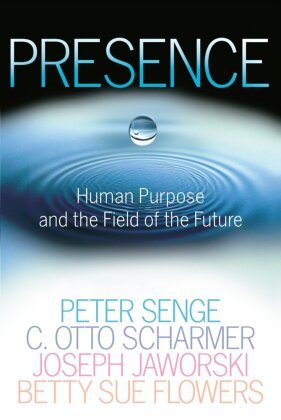Presence - Human Purpose and the Field of the Future
| Verlag | Bantam Books |
| Auflage | 2004 |
| Seiten | 304 |
| Format | 21 cm |
| Gewicht | 248 g |
| Artikeltyp | Englisches Buch |
| ISBN-10 | 0385516304 |
| EAN | 9780385516303 |
| Bestell-Nr | 38551630EA |
Four pioneers in the field of organizational learning--Peter Senge, C. Otto Scharmer, Joseph Jaworski, and Betty Sue Flowers--explore the concept of transformational change, from how it comes about to its influence on people and their institutions, as it relates to collective change and its implications.
Leseprobe:
1
The Requiem Scenario
November 2000
T he four of us were sitting in a circle in the study of Otto's home on Maple Avenue in Cambridge, Massachusetts. Outside, a light snow was falling. Inside, under the windows, Otto had placed bright red poinsettias. The walls were covered with charts, several with a large U drawn on them. Books were neatly stacked everywhere, and in one corner a computer hummed quietly.
"When Otto said that Jurassic Park was written in this house, I couldn't help thinking how ironic it was, given our conversations," said Betty Sue. "Now here we are sitting in the 'house of the dinosaurs' talking about a real-life nightmare scenario: the destruction of our environ ment; the growing social divide between rich and poor; the potential dangers of things like biotechnology; and escalating violence around the world."
"Isn't it ironic the way people talk about dinosaurs?" Peter said. "Today we say an organization is 'just like a dinosaur' when we mean it's slow and can't adjust to change. But you know, the dinosaurs did manage to survive over a hundred times longer than humans have so far. Whatever beings might take our place here in the future will prob ably say, 'Just like the human beings-too bad they didn't have the adaptive capabilities of dinosaurs!'"
Betty Sue shuddered. "Hearing human beings talked about in the past tense like that is terribly chilling. I guess we all know that since we have the means to destroy ourselves, it's possible that we will. The unthinkable is possible, but it's still very difficult to consider. The poet Auden said, 'We must love one another or die.' No one thinks we're very close to loving one another just yet, but we also don't seem will ing to consider the consequences of not doing so."
"And that's why we don't change," Peter replied. "I was speaking at a conference on business and the environment last week, and stayed at a conference center that I first visited twenty years ago. This center hosts aconference every year at which a prestigious environmental sustainability award is given, so you would expect it to be a showcase for environmentally sound practices, but I'm sure this place generates more waste per customer than they did twenty years ago.
"Everything is individually wrapped-coffee, sugar, shampoo- and each container will be thrown away. The materials used in the room were no more environmentally sound then they had been twen ty years ago-the wood hadn't been sustainably harvested, the plas tics and materials couldn't be recycled, and the appliances couldn't be remanufactured. I had asked for a room where I could open the windows. They didn't have any because they relied on central air-conditioning and heating. The electricity that drove the air condition ing undoubtedly came mostly from power plants that burned coal and other fossil fuels-heating up the earth in order to cool off our rooms. Then I saw this silly little bar of soap, individually wrapped. Somehowit epitomized the whole situation.
"Those soaps end up being ninety percent wasted-waste that is completely unnecessary. They could easily be replaced by liquid soap dispensers that create almost no waste. There are even biodegradable liquid soaps now. One is manufactured by a supplier in Sweden, partly owned by Scandic, which has gone from a mediocre, financially strapped business to one of Sweden's most financially successful hotel chains, in part through its commitment to 'the sustainable hotel room.' There's no reason being environmentally smart can't be good for business as well-at least in Sweden.
"So I stood there looking at this little bar of soap, listening to my air conditioner whir in the background, feeling angrier and angrier, and wondered why this American conference center still hadn't learned in twenty years what the Swedish hotel chain had learned in a few years. Why were we even still bothering to hold confe

